Why Julie Bishop never stood a chance against Scott Morrison
RESPECTED Political Editor David Speers reveals exactly how Scott Morrison got the numbers to become Prime Minister in his new book On Mutiny. And reveals why Julie Bishop never stood a chance for the top.
NSW
Don't miss out on the headlines from NSW. Followed categories will be added to My News.
RESPECTED Political Editor David Speers reveals exactly how Scott Morrison got the numbers to become Prime Minister in his new book On Mutiny. And reveals why Julie Bishop never stood a chance for the top.
Thursday August 23, 2018
At 8.30am the regular daily leadership meeting took place in the prime minister’s office, but there were a couple of empty chairs. Malcolm Turnbull, Julie Bishop, Scott Morrison, the National Party leader and deputy, and relevant staff were there.
Senate leader Mathias Cormann and his deputy, Mitch Fifield, were not.
At 8.45am Turnbull received a text message to let him know Cormann, Fifield and Michaelia Cash were in the adjoining waiting room.
They had come to deliver an important message.
Turnbull told what was left of his leadership group that he would shortly return but Morrison said, "You need a witness for this”, and went with him.
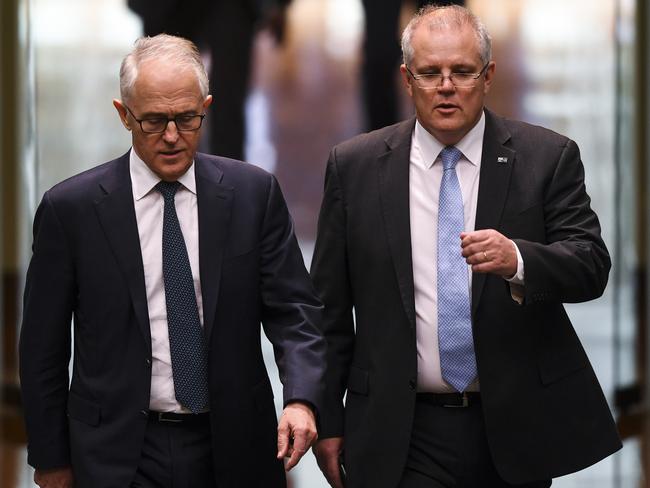
Once again it was Cormann who did most of the talking on behalf of the three.
They could not face parliament in this position, he told the prime minister as the three presented their resignations.
Turnbull accepted them, but made his feelings clear: they were leaving their government a "burnt-out wreck".
He felt betrayed, particularly by Cormann, and believed his friend was being weak and treacherous at a time when he should have been strong.
Cormann felt he had no choice.
He could have done nothing and let the situation drag on for another three weeks.
He knew he would damage his own reputation by stepping in but believed it was his responsibility to manage a speedy resolution for the good of the government and the party. This was a huge judgment call.
Turnbull himself may not have completely given up on his chances of survival, but those around him had
Cormann wasn’t solely to blame for Turnbull’s downfall, but the prime minister certainly couldn’t recover after losing such a highly respected member of his inner circle.
As the trio left the office suite, Morrison followed Cormann out the door. "If you do this," he said, "you"re making it happen."
Turnbull and Morrison returned to the leadership meeting in the prime minister’s main office, and the Nationals leader and deputy and the staff members were asked to leave.
It was just Turnbull, Morrison, Bishop and Christopher Pyne remaining, with Craig Laundy, who had been asked to join them.
None of them believed Dutton had the numbers, but most of the five knew Turnbull’s leadership was terminal.
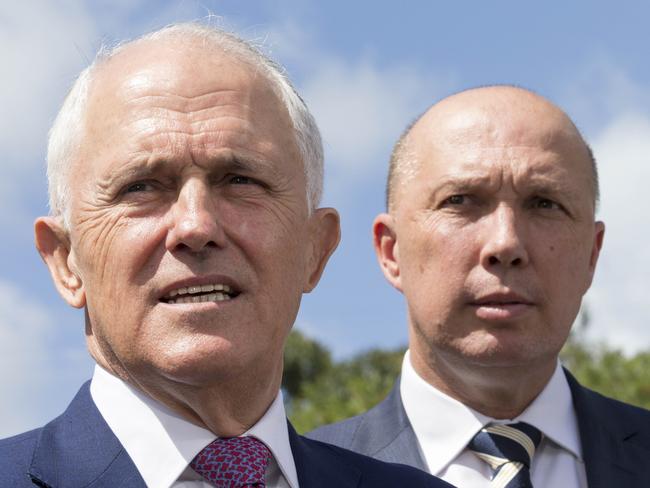
They agreed on a strategy to demand forty-three signatures (a majority) on a petition before a party-room meeting would even be held.
Only then would a vote be held to spill the leadership again.
"If I lose the spill motion," Turnbull told the room, "I won"t be standing in the ballot."
Then, speaking directly to Morrison and Bishop, he said, "So you two work out what you want to do."
Exactly how they reacted is contested.
According to two of those in the room, this was a "green light" for them both to start canvassing for support, and Morrison indicated he would.
According to two others, it wasn’t so clear-cut and neither signalled any immediate intention to run.
At 9.40am Cormann, Fifield and Cash walked into a parliamentary courtyard, ashen-faced, the waiting media capturing their agony.
"We went to see the prime minister yesterday afternoon to advise him that in our judgment he no longer enjoyed the support of a majority of members in the Liberal Party party room," Cormann told reporters.
They had resigned and the Turnbull Government’s unity was shattered.
Other ministers then piled in their resignations. Greg Hunt, Steve Ciobo, Michael Keenan, Angus Taylor and Alan Tudge may have "offered" resignations on Tuesday, but this time they meant it.
Turnbull himself may not have completely given up on his chances of survival, but those around him had.
They had to decide what to do.
They had to work out how to stop Dutton.
They had to choose a candidate.
The leaders of the moderates assembled in Christopher Pyne’s office.
Pyne, education minister Simon Birmingham, urban infrastructure minister Paul Fletcher, and backbench MP Trent Zimmerman, who was a former NSW Liberal Party boss, were joined by Laundy.
They all knew the pragmatic choice they had to make, but wanted to be sure.
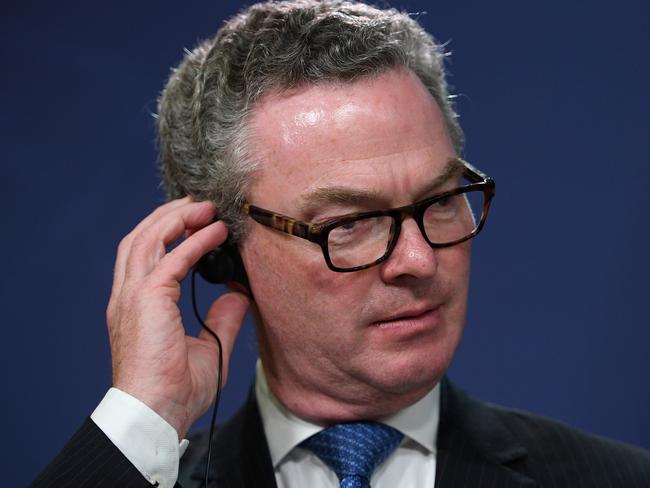
Could one of their own, Julie Bishop, beat Dutton?
Or would they have to back Scott Morrison, from the centre right?
A spreadsheet was printed with the names of every Liberal MP and senator.
Assumed voting intentions were then written alongside each name in blue and black pen.
First was a test of support for Bishop.
If the thirty-two moderates in the party were free to vote for Bishop, it was assumed she would receive 28 votes, Scott Morrison would win 18 votes and Peter Dutton 36.
There were two people they couldn’t be sure of and it was unclear at that stage whether Arthur Sinodinos would make it at all.
Morrison would therefore be knocked out in the first round of voting.
In the second round of voting, the moderate leaders assumed eight of Morrison’s eighteen votes would go to Dutton and ten to Bishop.
That would leave Dutton on 44 and Bishop 38, a very narrow win for the Queenslander.
If, however, the moderates were told to support Morrison in the first round instead of Bishop, they knew this would knock Bishop out and assumed all but two of her votes would go to Morrison in the second round, assuring him victory.
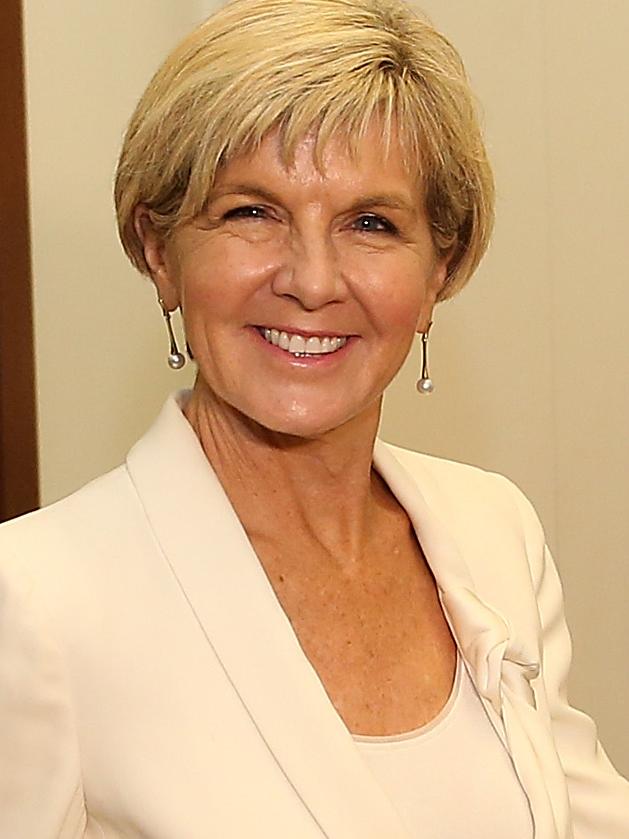
The moderate leaders judged this was a much safer plan to stop Dutton becoming prime minister.
After this "due diligence" test of the numbers, the moderate leaders agreed on their course of action: they had to back Morrison.
This was the decision that killed Bishop’s chances.
Pyne told Morrison the moderates would back him and urged him to hit the phones. Morrison’s supporters had already been on the phones for more than twenty-four hours, albeit without a declared candidate.
Pyne and his fellow moderate leaders then returned to the prime minister’s office and were joined by Bishop, defence minister Marise Payne and junior minister Anne Ruston.
What was said in this meeting is disputed.
According to one version, Pyne made it clear to the room that they had run the numbers and reached a verdict that only Morrison could beat Dutton.
Payne apparently agreed with this assessment.

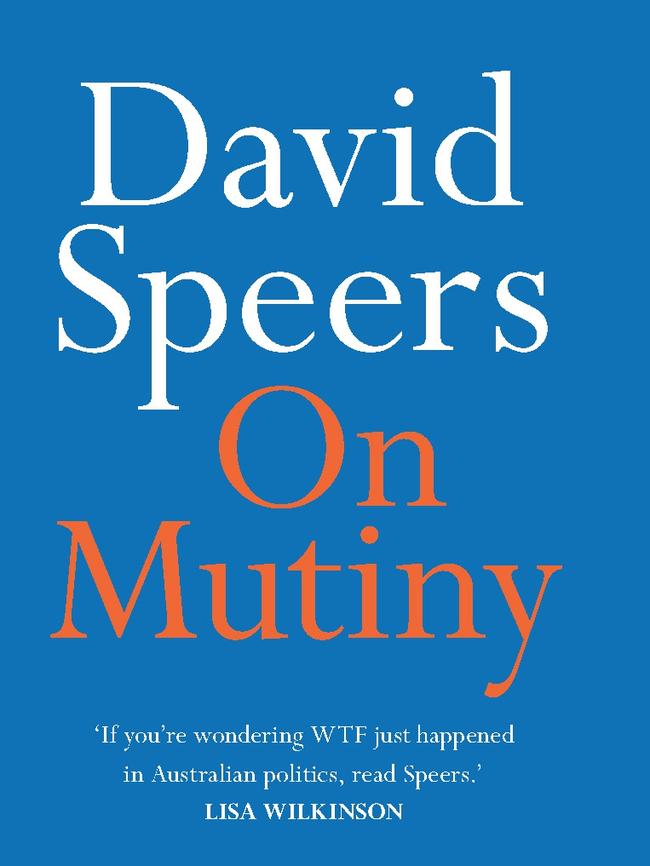
According to others in the room, however, the plan for the moderates to back Morrison was never made clear and Bishop was not given a chance to make her case.
At least one of the moderate leaders who was in the room now regrets not showing Bishop the list they had compiled so she could see clearly what would happen if she stood.
No one disputes Morrison was out of the blocks hours before Bishop.
He was calling and visiting colleagues; some even prayed together in his office.
Morrison is a proud Pentecostal Christian, and what some MPs refer to as the "God Squad" has supported his rise in politics.
Now they were praying for him to make it to the very top.
Morrison had a serious shot at becoming prime minister and a formidable team of operatives running his campaign.
Stuart Robert and Alex Hawke, from his small centre-right group, targeted conservatives, while Pyne, Fletcher, Birmingham and Zimmerman spread the word among moderates to vote for Morrison.
Edited extract from On Mutiny by David Speers, Political Editor, Sky News (MUP, $14.99/ebook $9.99).
